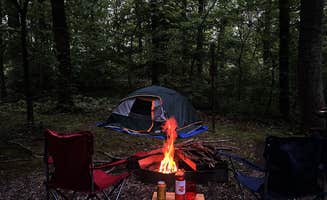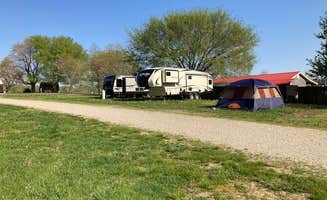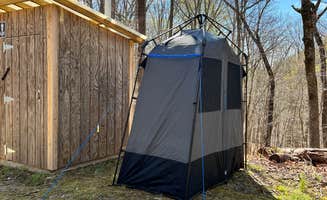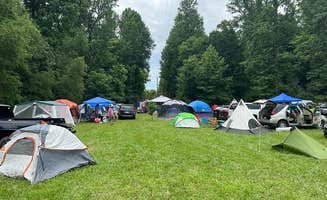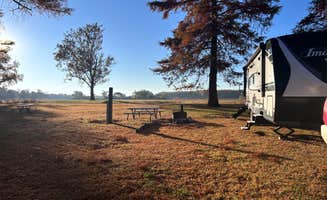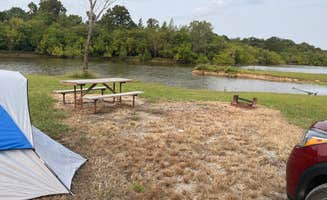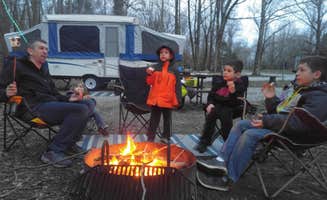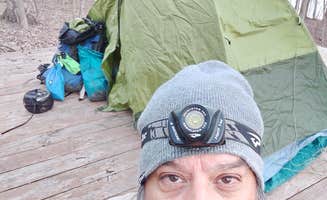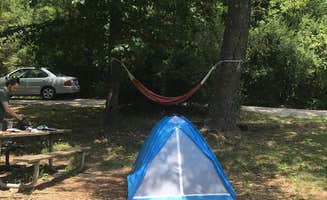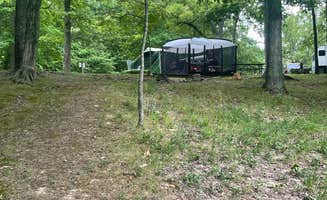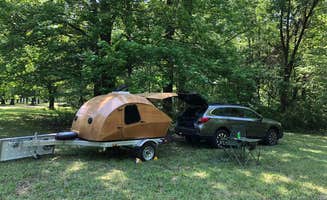Campgrounds near Cape Girardeau, Missouri sit at the eastern edge of the Ozark Plateau where limestone bluffs meet the Mississippi River floodplain. Summer temperatures regularly reach 90°F with high humidity from June through August, while winter nights often drop below freezing. The region's clay soil can create muddy conditions after rainfall, particularly at primitive campsites where drainage is limited.
What to do
Fishing opportunities: Lake Boutin at Trail of Tears State Park Campground offers accessible shoreline fishing. "Not a large state park, but the campgrounds, small lake with swimming area, and the views of the Mississippi River valley are good," notes Ralph S. The primitive sites provide easier lake access via hiking trails.
Wildlife viewing: The conservation lands around General Watkins Conservation Area contain multiple ponds and hiking paths for wildlife observation. "There are about 5 primitive sites. No water sewer or electric. There are multiple lakes in the area and hiking trails as well," writes John W. Deer sightings are common, especially in early morning and evening hours.
Hiking trails: The forested areas around Bean Ridge Pond Campground feature multiple walking paths with seasonal wildflowers. "The area is very pretty. Soft ground for staking a tent. Bugs were alright, no need for bug spray," according to Cameron. Trails range from short quarter-mile loops to longer routes connecting fishing ponds.
What campers like
River proximity: Campers appreciate the unique riverside locations where barges and boats can be observed. "One of the best camping views of the mississippi river! The campsite overlooks the mighty mississippi river and oh what a view it is, watching tugboats move barges up and down," writes Chad H. about Trail of Tears State Park Campground.
Quiet atmosphere: Despite being just minutes from town, many sites offer peaceful surroundings. At Pine Hills campers find solitude: "Only 1 other camper when I showed up. Very quiet and clean (although you do hear a train whistle occasionally)," reports Dave N. The campground features just a few sites spread across a wooded area.
Clean facilities: Many campsites maintain well-serviced bathrooms despite their rustic settings. "Park ranger drove through the campsite around 9:30pm, I really liked that, made it feel safer. Very enjoyable experience, bathrooms were extremely clean," writes Makayla C. about Lake Boutin Campground. Most state park facilities receive regular maintenance even during off-peak seasons.
What you should know
Train noise: Railroad tracks parallel much of the Mississippi River, creating periodic noise disturbances. "It's not a bad little spot for a weekend escape. There will be a train that comes through in the middle of the night, but other people have never been an issue for us," explains Eric B. about his stay at Trail of Tears State Park.
Limited services: Most conservation areas have minimal facilities. "No facilities, pack in-pack out. 1/2 mile gravel road leads to sites. Should be accessible by cars, vans, and small motorhomes/trailers," advises Dave N. about Bean Ridge Pond Campground.
Seasonal popularity: Campgrounds fill quickly during specific seasons and hunting periods. "This campground will always be packed for Missouri firearm deer season. Mid November. But normally has open spots rest of the time," reports Matthew G. about General Watkins Conservation Area. Weekends from April through October typically see higher occupancy rates.
Tips for camping with families
Swimming access: Lake Boutin within Trail of Tears State Park provides a designated swimming area during summer months. "There's a short hiking trail down to the lake, fun walk through nature in the area," notes Makayla C. The beach area has no lifeguard but offers gradual entry points suitable for younger swimmers.
Playground availability: While most conservation areas lack play equipment, some developed campgrounds include basic recreational facilities. At The Landing Point RV Park, "It has big sites and lots of grass. No pool or anything and a very small play area but it works well for them because they are older and don't care about those things," says Megan T.
Cell service considerations: Most campsites have limited connectivity for devices. "No WiFi. 2 bars Verizon LTE," reports MickandKarla W. about Cape Camping & RV Park. Downloading entertainment or information before arrival helps families prepare for spotty service areas.
Tips from RVers
Site leveling: Many campgrounds feature uneven terrain requiring leveling equipment. "Sites are flat and most are pull through," notes Joel R. about Giant City State Park Campground. Smaller trailers and campers have more site options than larger rigs at conservation areas.
Electrical limitations: Not all electrified sites offer consistent service. "Electric was not working at some sites and one post had hookups for two sites. No sewer, there is a dump station down the road," warns marcella about Horseshoe Lake Alexander County campground. Testing outlets before setup prevents surprises.
Access road conditions: Approach roads to some campsites can be challenging after rainfall. "Road coming into the camp ground can get a little rough depending on season, but it's gravel. Spots are perfect for smaller rigs," advises Matthew G. about General Watkins Conservation Area. Larger motorhomes and fifth wheels should call ahead during wet periods.



